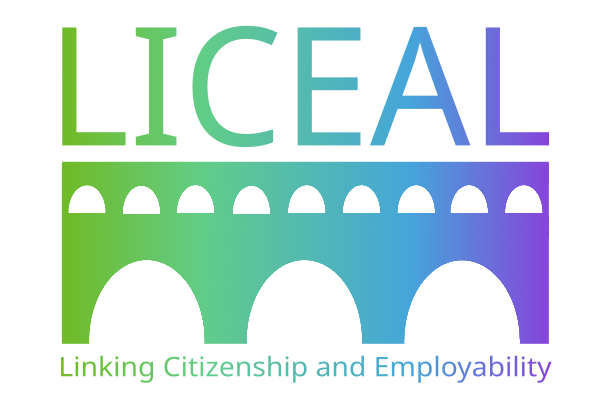
THE PARTNERSHIP
The project “LInking Citizenship and Employability perspectives in Adult Learning strategies and practices” was approved within the framework of the ERASMUS+ programme. The project is coordinated by Association EDIAS (France) in partnership with the International Institute of Humanitarian Law (IIHL) (Italy), the Fondation des Régions Européennes puor la Recherche, l’Education, et la Formation (FREREF) (France), Comitato Promotore S-NODI Gabriele Nigro (Italy), Democracy and Human Rights Education in Europe (Belgium), Learning Designers (Spain), Wiener Forum für Demokratie und Menschenrechte (Austria), BOGAZICI UNIVERSITESI (Turkey), Pôle emploi Auvergne-Rhône-Alpes (France).
After the COVID-19 crisis, Adult Education (AE) requires review in policies and practice. The separation between Continuing Professional Development and non-job-related AE needs to be re-considered in the light of the increasing weight, in employability terms, of transversal competences developed: collaboration, intercultural communication, critical thinking, creativity, initiative, learning path design capacity, empathy, capacity to face new situations, civic responsibility, SDGs awareness.
The increasing attention paid by EU and international institutions to “Life Competences” shows their importance for jobs and life. The approach proposed by LICEAL is based on adult learners’ empowerment and self-assessment competences development to undertake new learning paths to strengthen their capacity to be active (again) in the labour market and as citizens. Civic engagement and participation are important objectives per se, but also essential elements to increase employability in the evolving labour market, where key and transversal skills are as relevant as technical specific skills and prerequisites for teamwork, initiative and creativity. In addition, the increased commitment of many employers and professional associations to Corporate Social Responsibility justifies the project focus on what OECD Future of Education and Skills 2030 defines Transformative Competences: taking responsibility, creating new value, reconciling tensions and dilemmas, environmental responsibility. Bridging the aims and practices of professional and civic-oriented learning is a welldocumented emerging need (e.g.: JOB BRIDGE-ERASMUS+ project, use the Reference Framework of Competences for Democratic Culture in the Non-Formal Education Sector in the DARE Report).
The project has a high potential to translate the awareness of the integration opportunity of the two “poles” of adult education and training into a set of concrete instruments and good practices that may show how this integration become possible and effective when adult learners are allowed, as a result of their awareness of combined learning and development needs, to engage in original learning development paths.
THE PROJECT
LICEAL started in September 2022 and will last until August 2025. The ultimate goal of the project is to support adult learners, particularly those who face difficulties in the labour market and social marginalisation, to develop social, civic and relational skills which may contribute to their social inclusion and active participation in democratic life as well as to their employability. The relevance of transversal competences – such as cooperation, teamwork, negotiation, sense of initiative and creativity, self-regulation and respect of social norms – is the assumption that the project develops through its activities. Developing the capacity of learners, adequately supported by educators, to self-assess and undertake learning and personal development projects contributing to social inclusion and employability is the key strategic project objective. Encouraging civic engagement and participation is part of the project picture, following recent policy documents to develop social and relational skills together with more classic employability skills, specialised or transversal.
LICEAL OBJECTIVES
1) To study and to report how citizenship and employability competences needs tend to overlap in the near future, when applied to different groups of adult learners and different national and organisational contexts;
2) To identify, analyse and classify good practices that show different strategies and models to support individuals to jointly develop citizenship and employability competences;
3) To transform the collected and available knowledge into concrete methodological tools for adult learning professionals and volunteers and to create an open collaboration environment for further developments and exchange of good practices, to explore limits and opportunities of new digital certificates such as Individual learning accounts or micro credentialing using blockchain technologies;
4) To support adult learning organisations in the quality and innovation process that the new context requires, also facilitating the cross-fertilisation of successful practices developed between the AE and the VET sector (e.g., internal and participatory Quality Assurance approach, learning outcomes approach, internationalisation strategies, digitalisation strategies);
5) To distil and report the experience gained and the participatory processes activated into sustainable Policy Labs addressing the challenges of AE in the reference contexts and producing evidence-based policy recommendations for all levels of decision makers.
